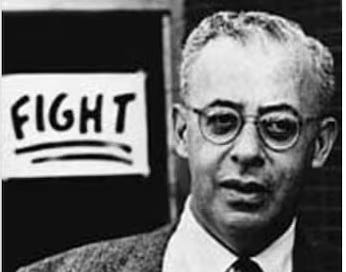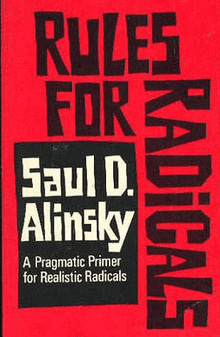I didn’t know another teenager who had ever heard of Saul Alinsky, let alone read his book, Rules for Radical, as required reading for dinner conversation. A community organizer in a depleted working class neighborhood, our dad took Alinsky’s protest methods as a way to call attention to and facilitate change for our community. They sometimes backfired but more often they brought about real change that made life better for the neighborhood.
I think the best way to honor today’s ‘No King’ protests, as well as my dad on Father’s Day, is to remind people that the current high-stakes in this battle are not unique—the people won the fight over and over again—and that American history is on our side. My dad is cheering us on!
A blueprint for following Alesky’s rules of engagement:
Empower the disenfranchised. Mobilize ordinary people, particularly those who are marginalized or disenfranchised, to fight for their rights and interests.
Build organizations. Create strong, community-based organizations that can sustain long-term efforts and provide a unified voice for advocacy.
Employ direct action. Using direct, nonviolent action to confront and challenge power structures. This includes protests, strikes, sit-ins and other forms of civil disobedience.
Tactics and strategy. Put pressure on those in power. These include targeting individuals in positions of authority, personalizing issues and using creative and disruptive methods to draw attention to causes.
Be pragmatic. Encouraging activists to be flexible, opportunistic and to use whatever means necessary (within ethical bounds) to achieve their goals.
Focus on local issues. Identify make the fight relatable and urgently important to people and communities if the Presidential executive orders and laws are enacted.
In Alesky’s own words:
On the importance of community organizing: “The only answer to organized money is organized people.”
On the role of psychology and perception in power: “Power is not only what you have but what the enemy thinks you have.”
Push your opponents into unfamiliar territory: “Whenever possible, go outside the expertise of the enemy.”
Undermine and delegitimize your opponents’ moral authority: “Make the enemy live up to its own book of rules.”
Place persistent pressure on your opponents: “Keep the pressure on.”
Leverage threats: “The threat is usually more terrifying than the thing itself.”
Wear down your adversaries: “The major premise for tactics is the development of operations that will maintain a constant pressure upon the opposition.”
On power and change: “Change means movement. Movement means friction. Only in the frictionless vacuum of a nonexistent abstract world can movement or change occur without that abrasive friction of conflict.”
On the tactics of organizing: “The most effective means are whatever will achieve the desired results.”
On the necessity of conflict: “Conflict is the essential core of a free and open society. If one were to project these values into a utopia, the utopia would be a curious and lifeless Eden with no conflicts and therefore no real freedom.”
On the importance of relationships: “If people feel they don’t count, then they don’t act. If they don’t act, the way for the exploiting minority to keep power is easy.”
On the power of people: “People hunger for drama and adventure, for a breath of life in a dreary, drab existence. This hunger must be met by organizing people around the burning issues of the times.”
And, as always, share!






From an old (I.e. previous) Socialist: a losing battle the evolutionary masses like leaders. Just hope for the best.
Back in the day, in my political days, as a young man, Saul Alinsky was a must read. Thanks for the reminder.